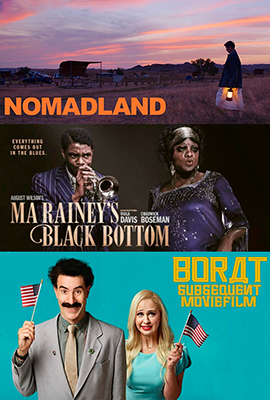With the Oscars being presented on Sunday, April 25th, I like to focus on the films and performances that I found most memorable. In keeping with the tradition of the late Siskel & Ebert’s “If We Picked the Winners,” here are my standouts for 2020 using the nominees in the main Academy Award categories. While others try to second-guess Oscar politics with who ‘should win’ or ‘will win,’ I like to keep it simple. In case you missed any of them, these are the films and performances I’ll remember- simply put, these are the ones:
Best supporting actress- Maria Bakalova; Best adapted screenplay: “Borat Subsequent Moviefilm”
Comedy doesn’t work without timing, and Sacha Baron Cohen picked the perfect time to reprise his role as fictional Kazakh TV journalist Borat. Ranging from encounters with a debutante ball in Macon, Ga. to QAnon members in the Northwest, it’s a screenplay adapted from skewering the unsuspecting. It succeeds with big laughs, thanks to the Trump Presidency as its foil and Maria Bakalova as an equally adept comedic co-star.
What Bakalova is asked to do might have frightened other actors but, improvising alongside Cohen, she expertly holds her own. It’s a brave performance that feels real. Easily convincing as his daughter, with the same comedic deadpan and timing as Cohen, she made me reminiscent of the onscreen chemistry Ryan and Tatum O’Neal shared in 1973’s “Paper Moon” in duping others with the film’s ‘behind-the-scenes’ con.
Best supporting actor- Daniel Kaluuya; Best original screenplay: “Judas and the Black Messiah”
Thanks to director and co-writer Shaka King, the screenplay for “Judas” presents a good structure to the transpiring events. Where the writing excels is giving the radical, revolutionary Black Panther Party a face with an intimate portrait of its people. Offering a surprising turn to preconceived notions, it emphasizes Illinois chapter chairman Fred Hampton’s message of strength in unity to provide healing over hurt.
As Hampton, Kaluuya dominates the film with spirited speeches but also finds Hampton’s softer side, particularly in his romantic relationship with Deborah Johnson (Dominique Fishback).It’s a tricky dual role emotionally with Hampton possessing both a condemning and kind nature, but there’s a natural feel to how well Kaluuya pulls it off.
Best actress- Viola Davis; Best actor- Chadwick Boseman: “Ma Rainey’s Black Bottom”
As an aging blues diva and her upstart band’s trumpeter, Davis and Boseman stand out by drawing the most out of the inner demons that occupy their complex characters.
Davis’ portrayal of Ma Rainey shows every bit of the power behind the paunch. With added weight, gold teeth and grease-paint make-up, Rainey seems grotesque at first. But with monologues comparing herself to a prostitute allowing herself to be used by record execs to retain her power or how her music and singing the blues help share a communal life understanding with her audience, Davis makes Rainey a vulnerable rock of determination.
Boseman, in his final film role, builds a cocky, confident and charismatic exterior to the character of Levee. Whether in dialogue detailing a childhood tragedy or challenging God not to turn His back on him, Boseman shows a bravado in Levee that belies a wounded past. Particularly in Levee’s God tirade, with the knowledge of Boseman’s personal battle with cancer, Boseman transcends the material to create a hauntingly bittersweet and emotionally-charged character recklessly running to escape the inescapable.
Best picture; Best director- Chloe Zhao: “Nomadland”
In a year where we all felt alienation mixed with a pervading sense of hope, no movie captured our shared sense as an American community surviving like “Nomadland.”
With a documentary feel in following Americans displaced through being jobless, homeless or unable to exist on the meager benefit offerings at the end of a working life, there’s a real sense of bonding and togetherness the film brings out. Being a ‘nomad’ and crossing the country for opportunity, we share in Fern’s (Frances McDormand) dealing with an unconventional existence when conventional trappings disappear.
To director Zhao’s credit, the movie creates an interesting and enveloping environment- one we can all identify with given our quarantine. It also allowed for internal questions: Could we survive a barebones existence on the road? Would we blend into commune-like caravans with others sharing our situation? Would freedom feel like an ongoing fight or could we see the beauty of the world beyond our battle to survive?
“Nomadland” tapped into our universal emotion during this Covid-crushing time. Ultimately, the film inspires us with hope and the knowledge that we are not going through this tough time alone.
Enjoy this year’s Oscars and in discovering the future Oscar winners of 2021.

